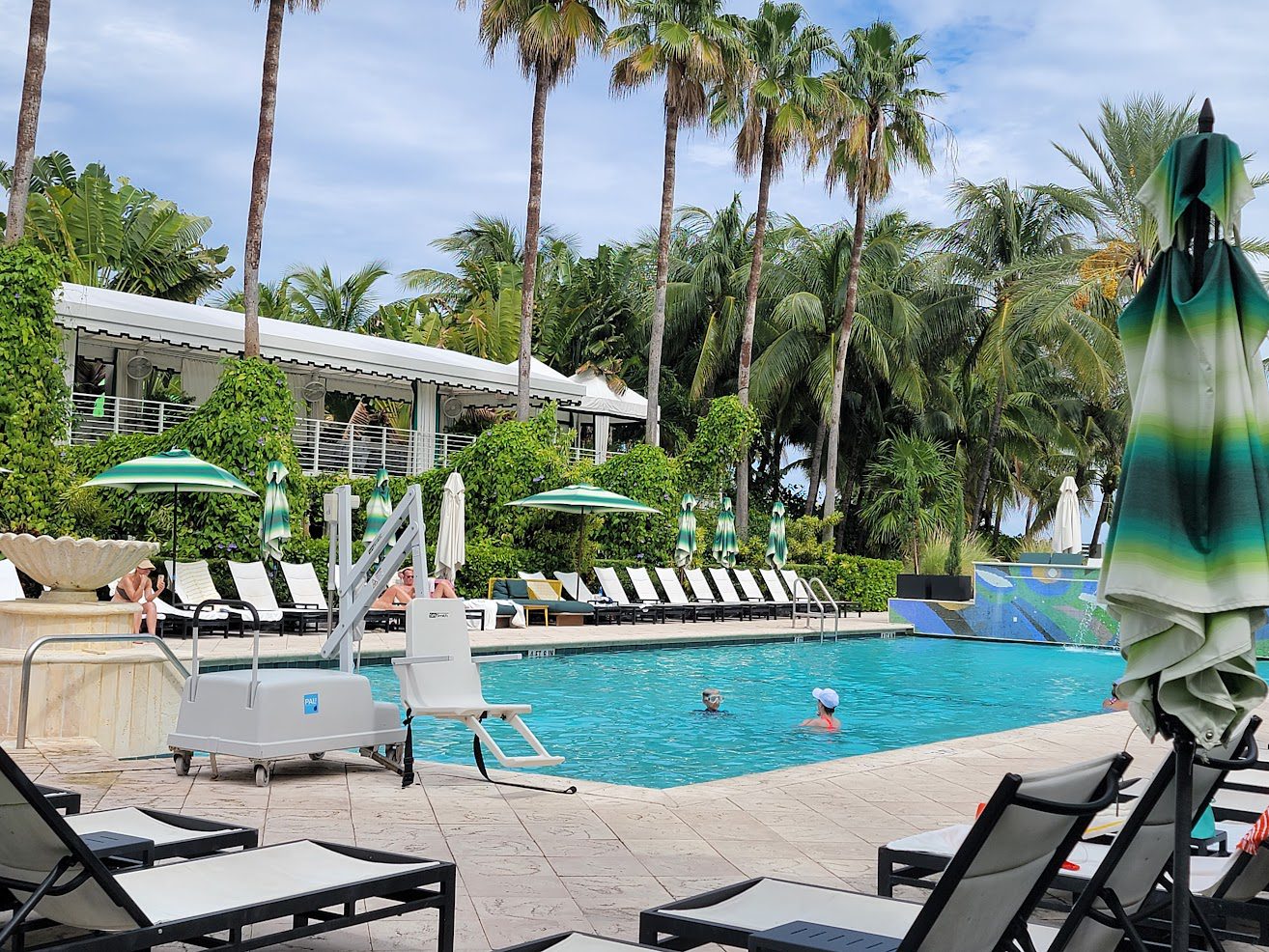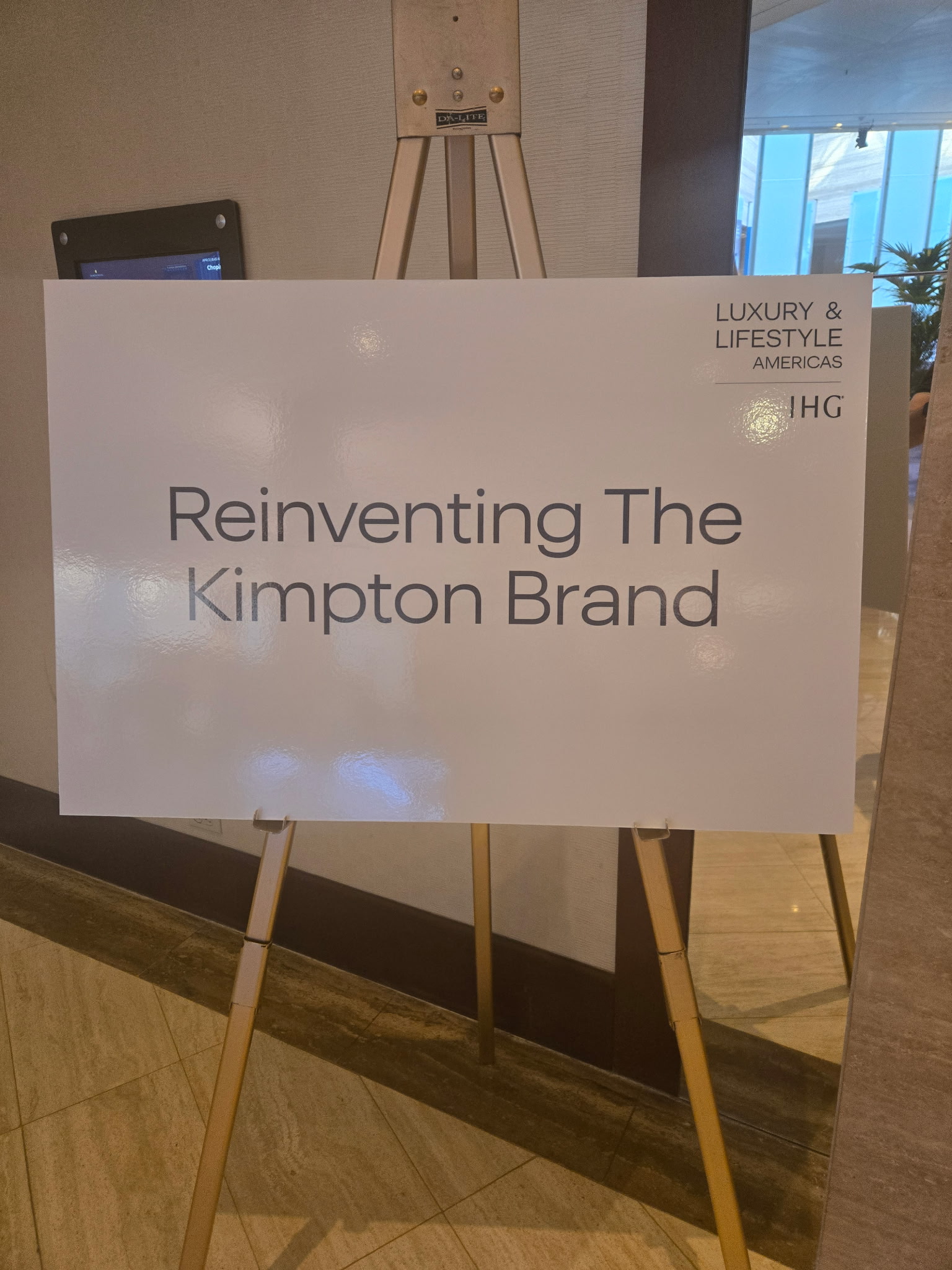A decade ago IHG completed its acquisition of Kimpton Hotels. They outbid Hyatt for the asset, and promptly destroyed it.
Kimpton could have been a fabulous acquisition but IHG never understood what to do with it, and they were the wrong chain to pull it off.
- No one really talks about the Kimpton brand anymore. It used to be buzzy.
- People used to go out of their way to stay at Kimpton. And they’d pay a premium to do so.

Kimpton Surfcomber Hotel, Miami Beach
What’s interesting about Kimpton was that they were more than just ’boutique’ they had a sense of place and style. They spoke to the narrative guests have about themselves. People wanted to stay there and felt better about themselves because of it – and as a result they could earn a real revenue premium.
Furthermore, their restaurants were actually good. They were places you’d go eat even if you were a local. I used to brunch at Kimptons when I lived in D.C. (back when they were still independent). They weren’t just creating spaces to sell food and beverage to guests, offering lowest common denominator food that would work regardless of who at there, sort of like the median airport restaurant.
The right approach would have been to buy Kimpton and learn from it, trying to figure out what you could port over to other more mass consumer brands to capture some of the experience and drive revenue gains. That’s hard but at least it’s a theory for how the transaction could have been additive.
Instead, IHG largely destroyed value. Here’s how they even described the reason for the transaction, ‘the boutique business is fast growing and we want more of that, consistent with how we’re already executing our current strategy.
This acquisition is right in line with our strategy to run a brand-heavy, asset-light business model and focus our growth in key markets like the United States. The boutique segment is the fastest-growing in the hotel industry and this gives IHG yet another foothold.
IHG is known for franchising rather than managing, and for weak control over owners. They don’t enforce standards. Contrast that to the early phase of Starwood Hotels launching the W Brand where properties had to spend heavily on lobby candle displays, and they had to be right regardless of cost. They were creating an experience, which was the entirety of the brand, and the reasons guests chose those hotels over alternatives.
It turns out that this is not controversial take. IHG itself knows it. From their Luxury & Lifestyle Americas Conference they are trying to ‘reinvent’ the Kimpton Brand.

I do think you can do an edgy, boutique-style hotel brand inside of a larger hotel conglomerate. W Hotels worked. But you need strong brand vision and a willingness to stick clearly to it, over the mantra at larger chains of ‘net rooms growth’ where they’ll do anything to sign owners and avoid imposing costs out of fear of scaring them away. You can’t require standardization, which is the typical way chains think about their value add.
A lot of what I’ve really liked about GHA Discovery is that the loyalty program has been a way to tie together small brands while those brands remain small and independent. I can leverage my rewards to try new places, and receive recognition even with small hotel groups I’ve never stayed with before. In some sense, it’s the best of both worlds (though it makes consistent delivery of benefits that much harder to achieve).


I could be wrong, but Kimpton was a Californian company and IHG is a British company. Culturally, those are two polar opposites when it comes to food, style and interests.
You’ve alluded to GHA hotels’ loyalty program before but to the best of my knowledge you haven’t really gone into any kind of detail. Can you tell us more? You tend to do exceptional analyses on such topics.
“Ruined”? I disagree. Under IHG, Kimptons are still excellent. Huge fan of their complimentary coffees each morning at (I believe all) locations. I’ve been to several recently (within the past year). The ones in the UK (Manchester Clocktower, Glasgow Blythswood Square), Grand Cayman (Seafire), Milwaukee (Journeyman), and Omaha (Cottonwood), all treated me well. Relatively new or recently renovated; well-trained, attentive staff; good benefits as a Platinum or Diamond member.
I am a huge Kimpton fan and have been since my first stay 21 years ago. I have been to 62 different properties over the years and I still think they are great. Yes, we do love occasionally have a so-so experience but for the most part our 40+ nights a year are great. When I see reinventing the Kimpton brand I worry what that means. I am one happy Inner Circle/Royal Ambassador/Diamond Elite member. The IHG merger opened up the opportunity to stay at other brands like Intercontinental, Regent, and Hotel Indigo and I love that.
You can tell the author doesn’t travel outside of the US very often – nor understand the strength of the brand internationally. IHG purchasing of the brand to expand it internationally has seen the brand elevate and fit very nicely into the global L&L scene. US owners not willing to invest and keep the product to the appropriate level is just as much a US industry issue as it is an IHG issue
Ownership groups got frugal and either went independent (Lorien, Glover Park, Van Zandt) or with another management company (Monaco VA, Monaco Chicago, Monaco Seattle, Alma, Nine Zero). Kimptons are expensive to maintain when you have to uphold brand standards. The goal when they merged with IHG was to help bring the brand Global; they did just that.
U.S. based owners are realzing they can give a half- behind product and still maintain ADR & occupancy; without the sharing revenue with management companies.
@Michael Henry — Wow, you really are the ‘king’ of Kimpton, sire. I’d say in addition to those brands you mentioned, add Six Senses as a top IHG brand at the moment. Some of my best stays and redemptions have been with them in Seychelles, Fiji, and elsewhere. They’re a bit different than the others, and I’d say, superior.
I totally disagree. We enjoy all the Kimptons that we stay. The courteous staff, the hotels are always clean and the restaurants have superb. I very seldom see a bad review on any of the IHG social media pages that I belong to.
People felt better about themselves for staying in a hotel? That seems sad.
IHG doesn’t understand luxury or boutique. Just have a look at InterContinental (branded with an oxymoron of affordable luxury), Regent (still stagnant despite some key openings), Kimpton (they really didn’t take this brand anywhere – used to have a separate team just to run the brand, now it got mixed in along with the entire L&L, Six Senses is practically still operating separately with limited overlaps. Don’t get me wrong. IHG is a solid company, but it’s far from the Four Seasons, Rosewood, Mandarin Oriental, etc.
In Europe you can split them into two. Some, like Paris, are amazing. London is decent if you avoid the super-tiny base rooms.
Others are just cheap conversions or projects where IHG simply took the money with no real thought – Amsterdam (ex Crowne Plaza) and Mallorca sit here. Some of the UK conversions, whilst decent hotels, have nothing ‘Kimpton’ about them.